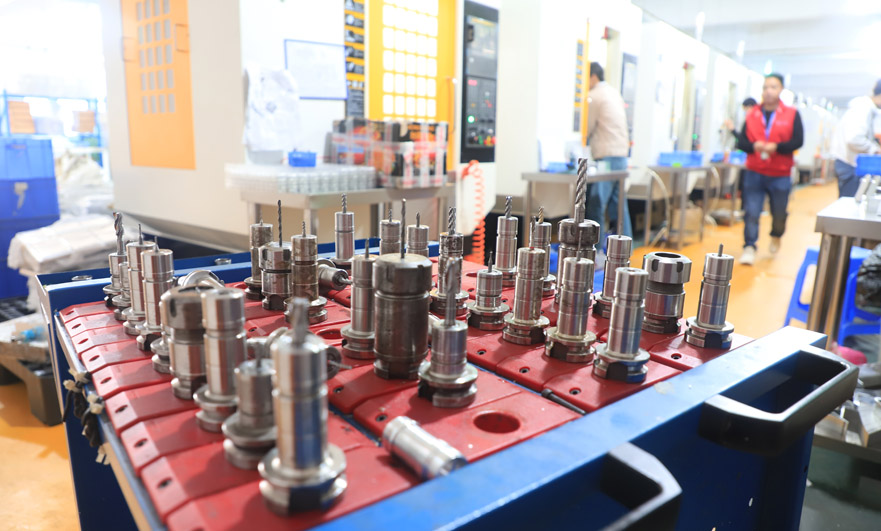Before becoming a mechanical designer, you must first understand which workshop tools are suitable for you in order to get started quickly. Because every machining shop is different, not all tools are suitable for everyone. Becoming a qualified CNC machining operator requires an understanding of basic tools and the ability to customize their own toolbox. Below we recommend to everyone the CNC machining operator tools that you need to have in daily CNC machining.

List of general CNC machining workshop tools
1. Calipers
The caliper recommended by almost all CNC machining operators is an indispensable tool for machinists. The vernier caliper is a measuring tool for measuring length, inner and outer diameter, and depth. The vernier caliper is composed of a main ruler and a sliding vernier attached to the main ruler.
\n2. Micrometer
Micrometer generally refers to a spiral micrometer. Spiral micrometer, also known as micrometer, spiral micrometer, and sub-centimeter, is a more precise tool for measuring length than vernier calipers. The length can be measured accurately to 0.01mm with a measuring range of several centimeters.
\n3. 6 inch scale (ruler)
The 6″ scale is a tool for measuring length and transmitting the measured value in a fixed length ratio. It may be the most commonly used tool for various types of work, measuring parts manufactured by different processes and other purposes. There are many versions on the market.
\n4. Dial indicator
A dial indicator is a kind of instrument, also known as a dial indicator, a dial indicator or a probe indicator. It is an instrument that provides a dial display with a clock hand similar to a clock face for measuring tiny straight lines. distance. The dial indicator is a versatile tool with a wide range of uses, such as measuring deck clearance, crankshaft thrust and straightness, elevator travel or aligning the vise with the machine axis, allowing you to obtain a reliable measurement distance. This is the most common micrometer. The table is read in 0.001 inch increments within a range of 1 inch.
\n5. Combination party group
The combined square ruler is a measuring tool used to measure angles and lengths. It is used for woodworking, metalworking, construction and other purposes. It consists of a ruler and one or more interchangeable heads, which can be fixed on it. The head is a standard or square head, used to arrange or check the right and 45° angles. It can also be used to find the center of the shaft end. A good 6-inch or 12-inch combo box is a good choice.
6. End mill starter set
An end mill is a type of milling cutter used in the milling process. From the application, geometry and manufacturing of drill bits, end mills can be used to make holes of various shapes and sizes, as well as profiling, contouring, grooving, drilling, reaming, etc. The end mill starter kit includes different specifications of tools, without it, you can not complete a large number of machining operations.
7. Sine, Cosine and Tangent Calculator
You should have a basic machinist hand tool in your toolbox. Scientific calculators are most commonly used for trigonometry and to calculate your feed and speed. Choose any calculator or small cheap Windows compatible laptop.
\n8. Edge Finder
Edge finder, also known as oscillating device, oscillating device, centering device or laser centering device, it is a tool used in or on machines such as mills to combine the processing tools with the center, edge, and layout Mark or mark features that have been machined during the setup phase of machining or other operations. The edge finder also performs well in the zero setting of CNC machine tools. They are usually fixed in the chuck, end mill holder or chuck installed on the spindle of the milling machine or drilling machine.
\n9. Deburring tools
Deburring tools are used to remove burrs and other defects on the inner and outer surfaces, hole edges, narrow groove angles, etc. formed during machining and cutting. It is also useful for rounding rough edges and removing chatter marks. It is more convenient and faster than using files. .
\n10. Machinist hand tools
Some common hand tools you can consider:Metric and standard hex wrench sets (hex wrenches): used to drive bolts and screws with hex sockets.
12 “Crescent Wrench (adjustable wrench): a fixed jaw, the second jaw can move left and right, often used to solve the problem of loose bicycle seats.
Ball head hammer (mechanical hammer): a good choice for metal processing, used to drive cold chisel, fix rivets, and bend and shape metal.
Soft hammer: bends and shapes metal without causing surface damage. Automatic center punching: used to mark the center of a point, such as the center of a hole in a drilling hole.
11. Measuring tools
Radius gauge set: used to measure the radius of an object.
1″ gauge block: used as a reference for calibrating measuring equipment used in the mechanical workshop, such as micrometers, sine bars, calipers and dial indicators.
Center gauge: used for lathe processing, used to check the angle when grinding the center contour.
Feeler gauge: used to check the spacing and clearance of the mold or any machinery and the critical clearance of the manufactured parts during setup or maintenance.
Telescopic gauge: a measuring tool with a spring pressure head, used with a micrometer to measure the inside of a hole or hole.
Summarize
In addition to these, there are many tools used in the machining workshop, such as frustrating knives, fatigue relief pads, notepads, pencils, sand wheels, etc. Customize your tool box according to the basic machining tool list of the machinist and your tools. The tools are also fully used in other industries. Use machinist tools to regularly check accurate measurements, so as to ensure the quality and accuracy of CNC manufacturing parts.